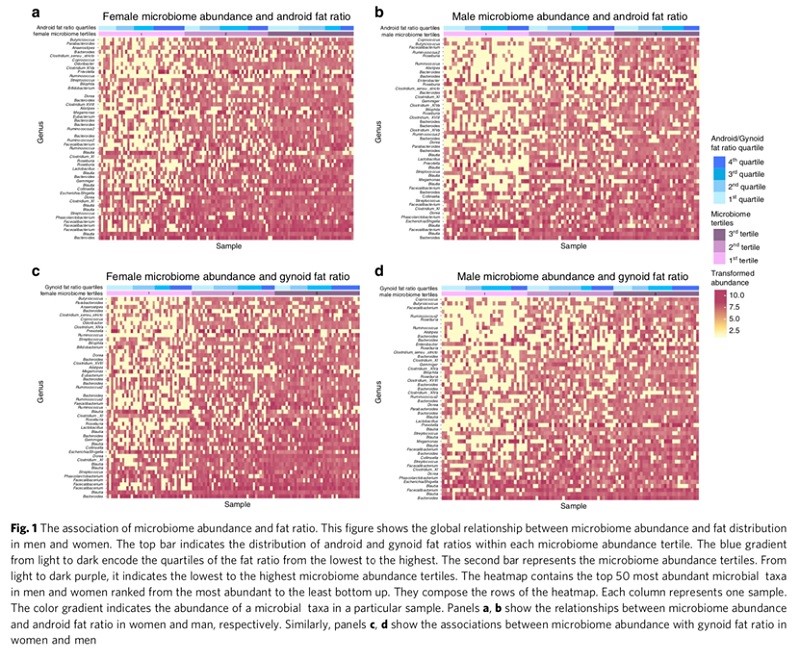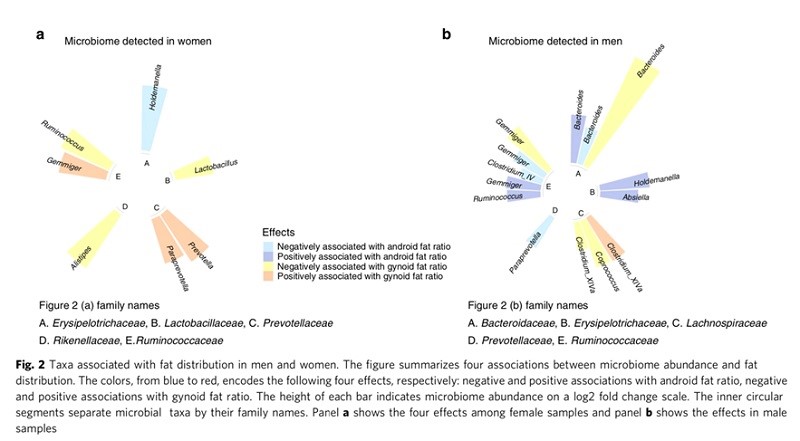A team under the leadership of Professor Shankuan Zhu from Zhejiang University and the Disease Prevention and Research Center of Stanford University recently published their research entitled "Sex-specific Association between Gut Microbiome and Fat Distribution" in the Nature Communications, a well-known journal, where they explained sex-specific association between gut microbiome and fat distribution.
The gut microbiome has been linked to host obesity; however, sex-specific associations between gut microbiome and fat distribution have not been well understood.Through this study researchers found that while both sexes have similar gut microbiome characteristics, including overall abundance and diversity, at the taxa level, gut microbiome and fat distribution showed significant sex difference. Researchers further screened 20 out of hundreds of taxa that was related to fat distribution, including 13 from men and 7 from women. No significant overlap was found between male and female. It is noteworthy that taxa from two bacterial genus (Holdemanella and Gemmiger) were oppositely correlated with fat distribution in men and women. Results from the study supported sex-specific association between gut microbiome and fat distribution ., suggesting that studies of the gut microbiome and abdominal obesity-related disease outcomes should account for sex-specific differences.


This study was based on the large-scale "WELL-China" cohort project launched by Zhejiang University and Stanford University. It was jointly completed by researchers from the two universities. The first correspondence author for this study is Professor Shankuan Zhu who comes from School of Public Health, Medical College of Zhejiang University. Zhejiang University and Stanford University have maintained a sound relationship and have established an efficient, collaborative, and interactive mechanism in the academic field. In November 2016, the two universities officially launched a 10-year large scale "WELL-China" cohort project in Hangzhou, China, which will benefit tens of thousands of people. As the first Sino-US parallel cohort study in the field of chronic disease prevention, control, and research launched by top universities in China and America, the "WELL-China" cohort project has analyzed factors affecting various diseases and health problems, developed high efficient health management methods, explored reasons for human health and well-being, and redefined health.

Professor Shankuan Zhu 's team
On the basis of the project, Zhejiang University and Stanford University formally established the Joint Laboratory of Health in June 2017, which became the "Health+" platform for Zhejiang University and Stanford University in November 2018. At present, the "Health+" platform, as a health-centered interdisciplinary cooperation platform, has covered many fields such as preventive medicine, public management, clinical medicine, computer application, agronomy, and has over 50 Chinese and American scholars. In 2018, it received funds from the "Strategic Cooperation Plan of World Top Universities of Zhejiang University". Since the establishment of the platform, the two universities have cooperated in a number of leading international research projects in metabolism, intestinal canal, fatty liver, fundus, physical and mental health, etc. The above-mentioned paper published in the Nature Communications is the first representative research outcome for the cooperation between the two universities in the field of health since 2016.